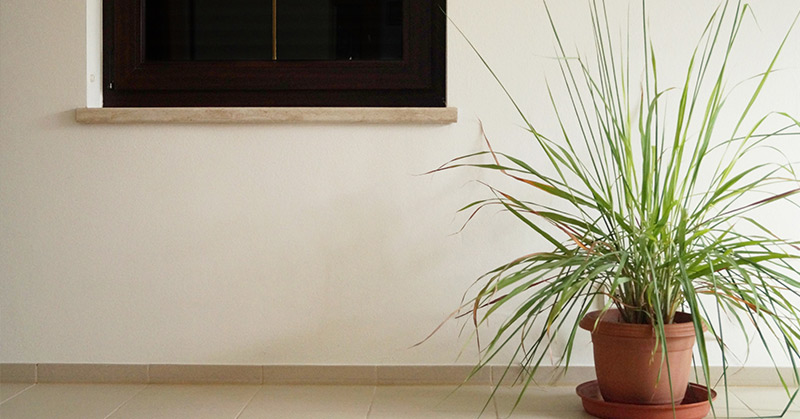Originally from Sri Lanka and South India, lemongrass is a common herb that is grown around the world [1]. Sometimes referred to as citronella (though they are different), it is a tall, stalky plant that tastes and smells like lemon, and is often used in Thai cooking.
Aside from its application in cooking, however, lemongrass has a number of other uses and benefits. It is fairly easy to grow, making it a perfect addition to your at-home herb garden.
Read: 16 Plants That Help You Get Rid of Bugs
Benefits of Lemongrass
Nutritionally speaking, this plant plant provides a number of benefits. It is a good source of folic acid, magnesium, copper, zinc, potassium, phosphorus, iron, calcium, and vitamins A and C [3]. The stems and leaves of the plant are said to have anti-inflammatory, antibacterial, antiseptic, antifungal, and diuretic properties, and so are often used in alternative medicine [4].
Lemongrass might help prevent the growth of some bacteria and yeast, and is thought to help relieve pain and swelling, reduce fever, improve blood sugar and cholesterol levels, stimulate the uterus and menstrual flow, and may have antioxidant properties [5].
When taken as a tea, it has been shown to help reduce high systolic blood pressure [6]. In this sense, it may help keep you feeling relaxed.
There are many other possible benefits, however they require more research before any definitive claims can be made. These benefits include:
- Dandruff – there is some research that suggests applying a lemongrass solution to the hair reduces dandruff for some people.
- Rheumatoid arthritis – applying lemongrass oil to the skin may help relieve pain in some adults with RA, however more research needs to be done to determine whether or not this is just a placebo effect.
- Thrush (yeast infection in the mouth) – there is some research that suggests that drinking lemongrass tea can help reduce symptoms of thrush in people with HIV/AIDS.
- Stomach and intestinal cramps
- Stomach ache
- Convulsions
- Pain and swelling
- Vomiting
- Cough
- Achy joints
- Fever
- Common cold
- Diabetes
- Exhaustion
- Headaches [5]
Uses of Lemongrass
You can prepare a tea made from lemongrass by soaking one tablespoon of fresh or dried leaves in a cup filled with hot water for ten minutes. Some people find that this tea has a soothing or calming effect, can help relieve their muscle soreness, improve their digestion, or help to ease cold and flu symptoms [7].
Additionally, mosquitos do not like the scent of lemongrass, so it can be used as a bug repellent in the summer months. This is because the plant contains similar compounds that are found in citronella. You can find a variety of products, including sprays, candles, and creams, that contain citronella for the purpose of keeping mosquitos away, and even just simply keeping your lemongrass pots near areas you like to spend most of your time in the summer can be an effective way to deter the blood-sucking insects [7].
In the kitchen, you can sprinkle lemongrass on your fish, seafood, and chicken dishes for a boost of nutrition and added flavor [7].
Read: Vetiver Oil Improves ADHD, Anxiety & Brain Health (And Repels Termites, Too!)
How to Grow Lemongrass
Lemongrass is fairly easy to grow because it adapts well to different types of soil. The plants should be placed in an area that receives some warmth and sunlight, but they should not get too much direct sunlight.
You can place the seeds in the soil for germination anytime from January to March, and the best temperature for germination is 20 to 25 degrees celsius. Under these conditions, the plants should sprout within twenty to forty days.
If you live in a cold climate, you should bring your plants indoors during the winter, since they do not tolerate ice or very cold temperatures very well.
It is important to note that there are not very many uses for the young plants, so you may have to wait until your lemongrass is a few years old and has shoots that are thick enough to be used or drying. For full instructions on how to grow and care for lemongrass, visit growveg.com.
A Safe Natural Remedy
Although many of the purported benefits of lemongrass require further study before they can be verified, there is very little downside to using this herb. Lemongrass is likely safe for most people when taken in food amounts, as well as applied to the skin or used in aromatherapy for short-term medicinal purposes [4].
There are some rare occasions where the oil has produced a rash for some people, and inhaling lemongrass could potentially have negative side effects for the lungs. Because lemongrass appears to stimulate menstrual flow, it is unlikely to be safe for use during pregnancy, as it has the potential to cause a miscarriage [4].
For the general population, however, lemongrass is a safe natural remedy that tastes delicious and can provide some positive health benefits when used correctly.
Read: 15 Medicinal Plants That Can Easily Be Grown In Your Yard

